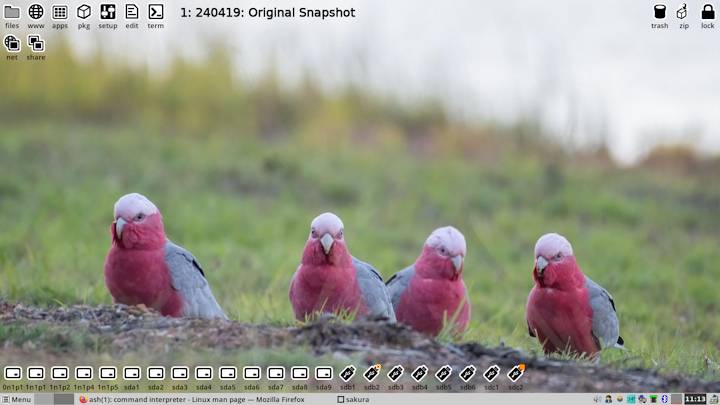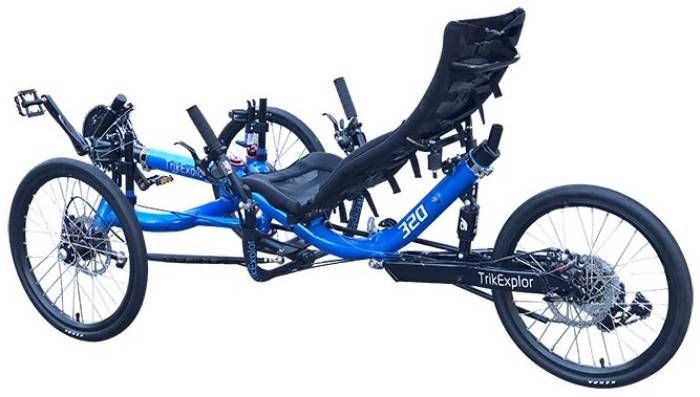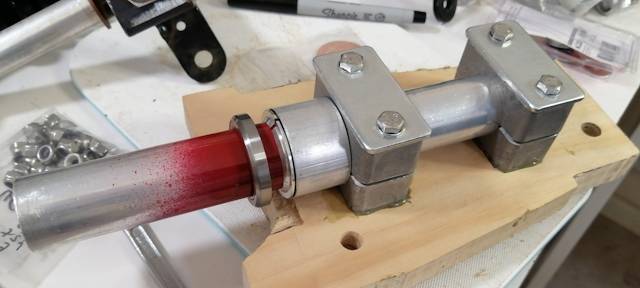QV version 240425 pre-alpha released
See 240423 announcement:
https://bkhome.org/news/202404/qv-version-20240423-pre-alpha-released.html
I was hoping to get onto implementing an update mechanism, but we keep finding bugs.
Download:
https://distro.ibiblio.org/easyos/amd64/releases/void/
One change made, and I have my fingers crossed that it is ok, is
have now included the Void 'shadow' package. I had previously told
XBPS to ignore 'shadow' if it is a dependency of any package, as
it requires 'pam'.
'pam' causes trouble, but I think now have managed to disable it. We want the 'shadow' pkg, as any package that wants to create entries in /etc/passwd (etc.) needs it.
Forum discussion welcome here:
https://forum.puppylinux.com/viewtopic.php?p=117896#p117896
...first post in that thread explains about 'qv-installer', for
direct install to internal drive.
I did some basic testing of 240425, very basic. Installed the
'devx' PET via PKGget, and it worked ok, took awhile. At the end
PKGget reported a lot of missing dependencies still not installed.
I don't know what to make of that, as XBPS did the installing, and
it would have installed all required deps. So probably PKGget has
got it wrong.
Tags: quirky
QV readme on github
The readme file on github was previously empty. I have inserted a basic explanation about QV:
https://github.com/bkauler/woof-quantum-vis
Tags: quirky
Fix bluetoothd endless restarting
In 2020 I posted about using the 'restarter' utility in /etc/init.d/bluetooth, to immediately restart 'bluetoothd' if it crashes:
https://bkhome.org/news/202011/xf86-input-wacom-and-restarter-compiled-in-oe.html
Yes, well, the worst has happened. Testing the latest QV, I observed /tmp/bootsysinit.log being endlessly appended, like this:
...
restarter[8300]: Executing [79]: (/usr/sbin/bluetoothd)
restarter[8604]: Starting [/usr/sbin/bluetoothd] with pid:8604
D-Bus setup failed: Name already in use
restarter[8603]: [8603]:sigchildhdl_GetExitStatus SIGCHLD handler, child_pid:8604, waitpid returned:8604, exit_reason:process exited, exit status=1, child exit status:256, signal:17, nchildren now:0
exit_valid:(), cmd_exitstatus2:1
[8603]: Exiting
restarter[8300]: Executing [80]: (/usr/sbin/bluetoothd)
restarter[8606]: Starting [/usr/sbin/bluetoothd] with pid:8606
D-Bus setup failed: Name already in use
restarter[8605]: [8605]:sigchildhdl_GetExitStatus SIGCHLD handler, child_pid:8606, waitpid returned:8606, exit_reason:process exited, exit status=1, child exit status:256, signal:17, nchildren now:0
exit_valid:(), cmd_exitstatus2:1
[8605]: Exiting
...
I do not know of a fix for this. 'bluetoothd' is still flakey and can crash. Just restarting it causes that dbus problem and it immediately crashes. I didn't have this problem with EasyOS, or perhaps I just didn't notice it.
So, have taken out 'restarter':
https://github.com/bkauler/woof-quantum-vis/commit/ac472ff697184ffaf3d48e6c6ff432b8d03f0577
However, 'restarter' does work, at least sometimes, without going into that endless loop. Now, if it crashes, that's it, you will have to manually restart it, by "/etc/init.d/bluetoothd start" -- and I hope that it doesn't hit that dbus problem.
It would be good if 'restarter' could set a limit on how many
restarts. Oh, and it is not just a QV problem; do a search on
"bluetoothd d-bus setup failed: name already in use" will return a
lot of hits.
Tags: quirky
QV version 20240423 pre-alpha released
Please read the 20240419 announcement:
https://bkhome.org/news/202404/qv-version-20240419-pre-alpha-released.html
Since then, there have been bug fixes, see the forum:
https://forum.puppylinux.com/viewtopic.php?t=11292
Also enhancements, see:
https://bkhome.org/news/202404/shell-wrapper-for-sudo.html
https://bkhome.org/news/202404/qv-snapshot-information-on-desktop.html
Bluetooth and samba fixed, among other fixes.
Still no update mechanism. Hope to do that for the next release.
Thereafter, no more need to download the huge .img file, just
install a small update PET.
Tags: quirky
Shell wrapper for sudo
I posted about sudo here:
https://forum.puppylinux.com/viewtopic.php?p=117577#p117577
Which has brought this issue back to my attention. I really don't know why sudo was working and then it wasn't.
Anyway, I developed a simple alternative, named 'sudo-sh', see these blog posts mid-2023:
https://bkhome.org/news/202306/goodbye-sudo-package.html
https://bkhome.org/news/202306/light-weight-replacement-for-sudo.html
But what about an app that calls the sudo executable? EasyOS doesn't have sudo, QV does but it doesn't work.
To fix this, I created a shell script named 'sudo'. I don't know if an app will refuse to run it, if it sees it isn't a binary executable, or doesn't have suid bit set. Also, it ignores all commandline options. Anyway, here it is, /usr/bin/sudo:
#!/bin/ash
C=''
while [ -n "$1" ];do
case "$1" in
-*)
case "$1" in
-g|-p|-U|-u|-C|-r|-t)
shift
;;
esac
;;
*)
C="$@"
;;
esac
shift
done
if [ -n "$C" ];then
exec sudo-sh ${PPID} ${C}
fi
This will only work in EasyOS and QV, that have sudo-sh. A simple test:
# su spot
# sudo urxvt
...a window pops up asking for the root password, then the urxvt terminal runs.
That sudo script is very simple, could be written in C.
Tags: quirky
QV snapshot information on desktop
Users of QV are likely to make heavy use of the btrfs snapshot feature. I have posted about QV's support for snapshots, see here:
https://bkhome.org/news/202404/qv-snapshot-deletion.html
What seems to be needed is "at a glance" information about what snapshot is currently running. I have implemented that information, written to the wallpaper, in format snapshot-number: creation-date: description.
At the first bootup, I have set the decription as "Original Snapshot", though it is not a snapshot as such, but the originator of snapshots. This description will also be translated if the user selects a non-English language.
Here is what it looks like, along the top of the desktop:

Here is the github commit:
https://github.com/bkauler/woof-quantum-vis/commit/f13a1f913fbd1409b34e03def05d33c8bfc50bc1
...using GraphicsMagick to write the text on the
image.
Tags: quirky
QV version 20240419 pre-alpha released
QV is a new very experimental Linux distribution, under development and still evolving. To read about what has happened so far, follow the blog posts with the "quirky" tag:
https://bkhome.org/news/tag_quirky.html
In a nutshell, QV has many features of EasyOS, except does not have a layered filesystem, nor SFS files. It is a "frugal full" installation, built from Void Linux packages using the XBPS package manager. It also has some EasyOS Kirkstone .tar.xz and PET packages. Another very significant feature is that QV is installed in a btrfs filesystem, with support for compression and snapshots.
I have been playing with a logo; this is the latest:

The letters "QV" may mean "Quirky Void", as this is a very quirky distribution compared with Void Linux. Or, it may mean "Quantum Vis", which is Latin for "has everything that you need".
Download from here:
https://distro.ibiblio.org/easyos/amd64/releases/void/
You can write the drive-image file to a USB Flash drive and boot that. Or, it can be installed directly to an internal HDD or SSD; with some caveats. See forum post for details:
https://forum.puppylinux.com/viewtopic.php?t=11292
If you look at the 'qv-installer' script, also at 'limine.cfg' in the drive-image file, you will see that "BOOT_UUID" and "BOOT_DIR" kernel parameters are now required, as well as WKG_UUID and WKG_DIR. The reason for this is that 'vmlinuz' and 'initrd' may be in a different partition than the working-partition, and an "update" operation will need to know where they are.
As there are no longer SFS files, the "devx" is now a PET package. It can be installed via PKGget, or downloaded directly from here:
https://distro.ibiblio.org/easyos/amd64/packages/pet/pet_packages-void/
In the latter case, right-click on it and choose "petget" from
the menu.
'devx-240419.pet' is a "meta package". What that means is that it doesn't contain any packages, just a 'pinstall.sh' script that will install everything required to setup a development environment. I suggest, take a snapshot first, before installing it, with an appropriate name, like "devx development evironment". Then, before doing any actual compiling, take a snapshot of the snapshot, to retain a pristine devx environment.
I'm not sure, but I think best to run "xbps-install -S" first, before installing the devx PET, to sync with the remote repositories.
XBPS will download 624 packages, a total of 592MB, so be prepared for it to take awhile.
After install has finished, delete /etc/profile.d/gawk.csh and /etc/profile.d/gawk.sh -- these are broken.
If you want to install with "new2dir make install", the 'installwatch' package is required. Download it from here:
...download, right-click and choose "petget" to install it.
You will notice that there is no longer an "update" icon on the desktop. This is because updating will mostly be done via XBPS. It is intended that there will also be a kernel PET and an update PET that will have fixes.
This update strategy has yet to be implemented. It will mean that you only have to download the big .img file once, and there-after rely on XBPS to update packages, and kernel and patch PETs.
Feedback welcome at the forum.
EDIT 2024-04-23
Superceded by version 240423, see announcement:
https://bkhome.org/news/202404/qv-version-20240423-pre-alpha-released.html
Tags: quirky
Connecting trike front suspension to frame
Continuing my recumbent trike front suspension project, this is the previous post:
https://bkhome.org/news/202403/considering-heim-joints-for-wheel-knuckles.html
Getting close to putting it together, decided today to post about an aspect of the project that is rather weird...
My trike is a TrikExplor/Motrike with a "320" frame. There are various models based on this frame, for example:
https://www.motrike.com/product-item/rear-suspension-recumbent-trike/

So, there is a central frame tube, and a cross-beam to which the
wheels are attached. Where the weirdness comes in, is the
cross-beam is attached to the central frame at a hinge-point,
complete with ball bearings ...except, it doesn't actually hinge.
If you look carefully at the above photo, there is another member
coming out from the cross-beam and attached to the central-frame,
locking the cross-beam at 90 degrees to the central-frame.
Hinging, that is, steering, occurs at the wheels, as is done for all recumbent trikes.
So why the ball-bearing join, when it doesn't hinge? The only reason I can think of is that the 320 frame was designed as a basis for many different trike designs, including the possibility of swivelling the entire cross-beam.
When I bought this, I hardly knew anything about trike design.
Soon after buying it, I was thinking, if starting again, I would
buy a more "normal" trike frame; however, most trikes weld the
cross-beam onto the main frame, so I would have had to cut it off,
then weld new framework. Messy; at least this 320 frame, though
weird, does make it easy to detatch the cross-beam and fit
something new.
I think that a lot of these have been sold in the USA, so if someone reading this can obtain a secondhand one cheap, with a view to modifying it, then this blog post provides some useful information.
What I needed is a tube that will slide into the ball bearings, with some means of attaching a framework. This is what I put together:

The tube is 30mm OD aluminium, which is a perfect fit. Well, not quite. It is a perfect fit for the top-most bearing, but there is a very slight sloppiness sliding through the bottom bearing. Reason is, the tube needs to be painted, then the bottom bearing becomes a snug fit.
When I inserted the tube and pulled it out, the bottom bearing came out, that you can see in the photo. To the immediate right of the bearing, there is an adapter-ring that I took off the trike. Then to the right of that is an aluminium sleeve that I cut to length, so as to fine-tune the height of the suspension-frame relative to the trike-frame. That sleeve is 30mm ID, 40mm OD, but I had to sandpaper the inside a bit to get it to slide over the 30mm OD tube.
Here are where I obtained the parts:The 30mm pipe clamps. But, I see right now they are out of stock. Perhaps there are metal ones elsewhere in Aliexpress. There are plenty of plastic ones available, which would probably be strong enough. This is where I got mine:
https://www.aliexpress.com/item/1005005478071535.html
I purchased 30mm OD, 20mm ID, 240mm length aluminium pipe. Length is exactly right. Thicker wall than really needed. From here:
https://www.aliexpress.com/item/1005004347889082.html
The aluminium sleeve is 40mm OD, 5mm wall thickness, 100mm length, from here:
https://www.aliexpress.com/item/1005005964994480.html
I spray painted the tube with an etching primer, followed by a red gloss enamel. Just one thin coat of each.
A bit of a hassle attaching to the trike frame, but probably
better than having to cut off a cross-beam and weld new framework.
Hmmm, but I am going to end up needing a bit of welding to the
trike frame anyway.
The actual front suspension is just about ready to be put
together; that will be a future blog post. That piece of pine is
misleading; there is a lot more to it, with metal
reinforcing.
Tags: light
